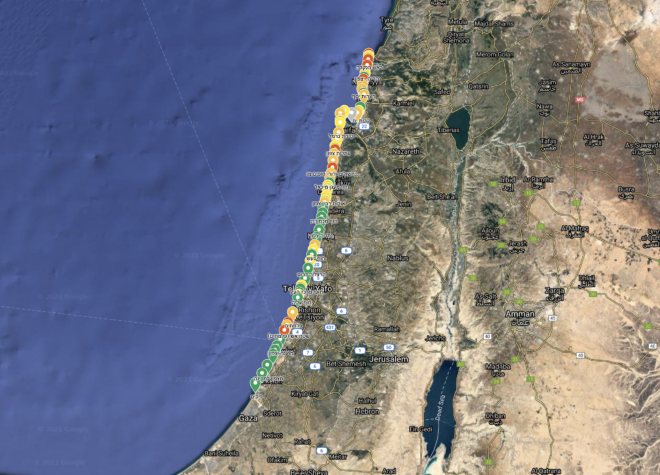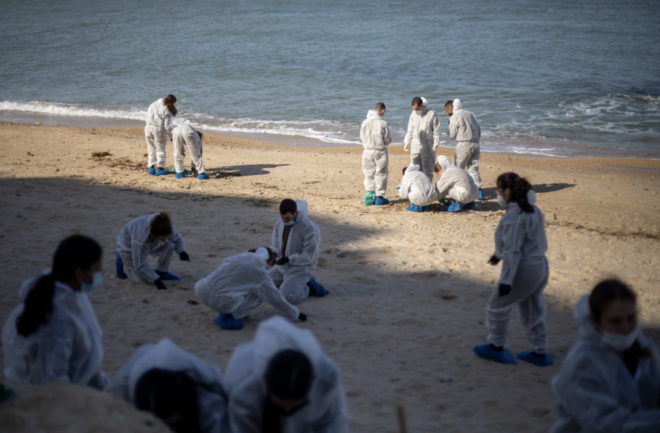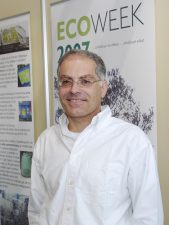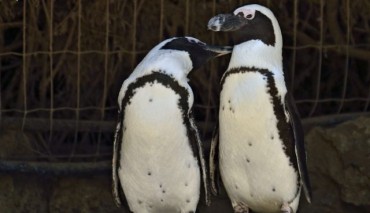An oil tanker from Greece called the Minerva Helen is suspected of dumping its bilge and catastrophic amounts of tar and oil into the Mediterranean Sea. A current ban from Mediterranean seafood and fish is in effect as the public and soldiers pictured above scrambles to clean up the tar. We reached out. The company denies any link.
Give Israelis an emergency and you will see what kind of stuff they are made of. The recent crisis is a large oil spill which is currently washing mounds of goopy tar-like bitumen onto every inch of beach along Israel’s 170-mile coastline of the Mediterranean Sea.
The bitumen also known as dilbit can have some suspected links to rare cancers, and is more dangerous than regular oil (read InsideClimateNews here) and is suspected to be from the bilge of an oil tanker passing through the Mediterranean Sea, about 31 miles off the coast of Israel. The source of the tanker is unknown, but those close to the heart of the matter suspect it was poor weather and just a tanker in trouble that caused the release. Local media are blaming a tanker called Minerva Helen, which flies under the flag of Greece. The name was revealed yesterday after a gag order lifted. We spoke with the company and they deny any link.
The feeling on the ground in Israel is not who or which country is to blame, but what kind of system can we have in place for the future. Because as long as there are tankers and pipelines and us using oil, spills are bound to happen. One tanker off the coast of Yemen is a floating time bomb.
The horrendous photos of dead turtles and a rotting baby whale with its belly full of tar dead ashore an Israeli beach has impacted the public to spring into action –– some 10,000 people have turned up to help pull the beached globs of oil out of corals, rock faces and sand. This was orchestrated through an NGO called EcoOcean which already had a plan of action set up two years ago. The organization has not only helped citizens see how they can make an effort to clean up the problem, but it has set an example to the Israeli government on how to future proof against environmental disasters.

Beached baby whale, (AP Photo/Ariel Schalit)
Typically Israel’s Ministries act in response to demonstrations and lobbyists’ concerns du jour. They act when faced with a crisis but they don’t like anyone telling them what to do.
So when Andreas Weil, a then new immigrant to Israel from Sweden wanted to change how Mediterranean marine education and health was managed by Israel, he didn’t whine or point fingers. He made a plan, raised money, built a research ship and an educational system, and started teaching the Israeli colleges, non-profits, government groups and society how to cooperate to protect the sea. That was 15 years ago, and the NGO is called EcoOcean. Among its flagship projects is the Blue Flag Program to clean Israeli beaches, in better times from cigarette butts, and municipal runoff.

Andreas Weil, a hero for the sea
In worse times EcoOcean was ready, Weil tells Green Prophet. Two years ago he approached the Ministry of the Environment and asked if he could set up a coordinated beach cleanup system, for emergency purposes. At the time there was nothing in place. He said he would build a pilot. If EcoOcean could use some of their resources, then a system could be up and running well within 3 years, with volunteers trained and equipment set up. At that point he’d convince the government to find money and run it.
EcoOcean raised almost $1 million USD and set up the emergency beach response plan which was mobilized right away: “This week more than 10,000 people were helping, some of them running around in dangerous amounts of tar,” says Weil. “We did all this to push the Environment Ministry to take responsibility for what it needs to do. I hope this accident will make it happen. There is no way they can retract now and say they don’t need a plan like this.”
Unlike other hopeful activists that try and change the Israeli attitude to a “green” one, Weil, as an outsider from Sweden, with a no-nonsense socialist mentality just wanted to “get the money for it and show the government how it can be done.”
“It’s definitely a Swedish thing,” he says. “I guess there is a reason why we are giving out the Nobel Peace Prize,” says Weil, who over the years of knowing him, I can also say it’s also an Andreas thing. He’s consistently persisted and built and encouraged others to be part of the dream of saving the sea, usually putting everyone else from the organization in the spotlight instead of himself. Organizations like the Cousteau Foundation have reached out to cooperate with him.
“This is what I learned from living in Israel,” says Weil. “I saw how they were working. They were spending money on an agenda, demonstrating. And I thought, how can we do it differently? Israelis listen to common sense. They don’t want to hear you telling them to pick up plastic from the street.”
Weil’s foresight rang true.
And from their homes the people came to clean up the sea. Organizing on parents’ Whatsapp groups, Facebook groups that promote parties: everyone was turning out to be part of the cleanup.

Ariel Mielnik (right), with friends
Clumps of tar larger than footballs were rolling up onto shore and volunteers mobilized to move it from reefs and rocks into plastic bags for disposal. One of them was Ariel Mielnik, 32, a clinical psychologist from Jaffa. He found some like-minded people on a Whatsapp group, The Friends of Jaffa, to clean up beaches in the Tel Aviv area: “We arrived and the staff gave us all kinds of protective equipment and gave us a fast brief on what to do,” he tells Green Prophet.
“We blasted electronic music throughout the beach, having a good time while cleaning up as much as we could and for as long as we had free time,” he says. “It was heartwarming to see so many volunteers. Runners would clap for us and shout ‘kol hakavod [good for you]’ which was nice.
“I imagined black pools of tar and tar stuck to everything. The good news, when we approached we couldn’t even see it. Now the very bad news is the tar has spread to small pieces of around 4 mm, which makes it super difficult to pick up bit by bit. Only us humans can do this as far as I know, and the job feels impossible to complete.”
 Fashion photographer and videographer Doron Barsky, also from Jaffa, headed further north and was shocked by the blobs of tar as far as the eye could see. He was at a beach in the northern part of the country called Nasholim, helping fill bags with tar and hardened oil rocks.
Fashion photographer and videographer Doron Barsky, also from Jaffa, headed further north and was shocked by the blobs of tar as far as the eye could see. He was at a beach in the northern part of the country called Nasholim, helping fill bags with tar and hardened oil rocks.
He shows the oil in his hands in the video below.
A gag order kept the identity of the ship unknown, until Wednesday at 4 PM where it was released to the mainstream media that the suspect ship is the Minerva Helen, the same Greek ship involved in major oil spill near Copenhagen in 2008. The gag order was put in place so those running the oil tanker would not destroy evidence.
The Minerva Helen left Port Said, Egypt on February 11 en route to Israel and denies any connection to the oil spill. It also denied its involvement in the Danish oil spill.
The vessel (IMO: 9276561, MMSI 240147000) is a Crude Oil Tanker built in 2004, 17 years old. You can track the Minerva Helen online and environmentalists might consider meeting it as it reaches its next port Piraeus, Greece, on February 27. It is owned by Minerva Marine, from Athens, Greece. A statement from the company denies any connection to the spill.
They announce to the media, “On the 15th of February 2021 the vessel sailed directly to Cartagena Spain. During the period that the vessel was drifting offshore Port Said awaiting her next employment, the vessel was not involved in any operation nor in any other activity that could be connected to an oil discharge at sea.
“The vessel is classed with the American Bureau of Shipping (ABS). Minerva Helen is well maintained without any structural or other defects that could cause an oil pollution incident.
“It should be noted that on the 22nd of February 2021 the vessel was inspected by the Spanish Port State Control Authorities in Cartagena and was determined to be without any deficiencies or observations, and confirmed that the vessel was in a satisfactory maintenance and operational condition without any defect.”
Jonathan Spencer, a crisis response manager representing the company tells Green Prophet: “There are no formal allegations regarding Minerva Helen, despite speculation having continued in some media outlets. For your reference, I have also attached an article published by one of the shipping industries leading data and intelligence companies which further demonstrates that Minerva Helen could not have been involved (The link to a PDF is here).”
Spencer adds, “Other vessels are clearly shown to be in the area in the Lloyds List piece (links to PDF)), and clearly such vessels will be of interest for any subsequent inquiries that continue. This of course remains a matter for the Israeli authorities.”
____
Characteristically for Lebanon, also seeing its share of tar on the shores, blamed the dump on Israel; its Prime Minister Hassan Diab declaring “a ship of the Israeli enemy” was to blame for the oil spill that has reached Lebanon’s southern Mediterranean shores. His knee-jerk response to the spill was much different than Israel’s which called for a ban on visiting the beach, eating fish and which mobilized thousands to clean up the mess.
Greenpeace Med responded to the lack of action of Diab’s government, still in shambles after the catastrophic explosion last year that ripped Beirut apart. And the whole political cabinet quit. Officially Diab quit as well but is serving as interim PM until a new election can bring about a capable leader for the troubled country.
Greenpeace sent us this message to share about the lack of non-action by Lebanon’s leadership, hardly functioning in the good days: “We call for immediate action from the Ministry of Environment to assess the severity of this spill via an urgent survey and monitoring programme and to put in place a plan to minimize the impacts on the environment and public health.
“Based on the assessment results, the authorities should provide safety guidance to the Lebanese people especially with regards to fishing and swimming activities. This incident adds up to the long list of spills that have been threatening the rich marine biodiversity and impacting the populations of the Eastern Mediterranean region and is yet another facet of the destructive nature of our global systems’ addiction to fossil fuels.”
Future-proofing with this marine biologist who is taking inventory
We spoke with marine biologist Philip Nemoy, a post-doc researcher at the Israel Oceanographic & Limnological Research before the gag order was lifted and he said that he had not yet heard from what country the oil spill tanker originated before the gag order was lifted. He didn’t think pointing blame was the right response to a catastrophe.
According to Nemoy there are tight regulations in place at sea and accidents are bound to happen as long as ships carry oil, and as long as oil rigs carry it in pipes undersea. And this all will continue as long as our hunger for oil persists.
The amount of the oil spill on Israel’s shores does not equal the Exxon Valdez, the Gulf War oil spill, or the Deepwater Horizon he says, but it has made the public and government ask itself some important questions: Who is responsible for this kind of marine disaster when it strikes?

“The threat is there and it is not going to disappear in the nearest future because we need oil transported from oil rigs in one way or another and these are prone to disaster despite all the measures and precautions taken. All those dealing with oil at sea have a lot of regulations. And they have a lot to do to avoid any spill,” Nemoy tells Green Prophet.
“I think the last spill was due to a major storm and something went bad to the ship at sea during the storm and it can happen to any ship from any country. Sometimes nature is stronger than us. We need to ask ourselves what do we need to do when we see it happening? We need to cooperate when an oil spill happens.
“The spill is a warning light for our society. That it is not only the government and not only the people and not only the NGOs. We are all connected together. What I can see is that the connection and the dialogue is lacking. It should be developed at good times and not in the time of troubles.”
He credited EcoOcean for the first response and noticed that the israeli society is deeply disconnected from its parts, yet he also acknowledges how “quickly we can become connected today. I see how things happened in the timeline of hours and days. Just in Haifa, hundreds had come together very quickly.”

Philip Nemoy
Generally, Nemoy explains, the Middle East is a “balagan” or mess –- with a lot of hand waving and shouting. From the Former USSR, he saw this a bit during the cleanup but he also saw that even more could be done if more preparations were done in advance with deeper cooperation between the NGOs and Government groups, like there is in times of war.
“This way we can inform people what we can do. The same way we’d inform people when there is a war or earthquake. There can be a list of simple things you can do to help, or what you can do so you won’t harm yourself. Some people who went to the oil spill might have harmed themselves if they inhaled the fumes or touched the tar.”
Nemoy worked for the Environment Ministry at one point and understood that most companies don’t want to pollute the environment: “They want to carry on their business. If they did pollute it was because they did not know or did not want to know. It does not take a huge amount of money to explain to people about the consequences if they do pollute.”
In the past Nemoy worked to understand how he could commercially cultivate sponges in aquaculture effluent of fish farms at sea. “Which was difficult.”
Currently he is building a nationwide database, crowdsourced, to quantify marine life with environmental and commercial usefulness. Had the database been already ready, he’d have been able to tell organizations like EcoOcean where to focus efforts.
With his eyes wide open he has yet to hear of any cleanup efforts from nearby Gaza, Egypt or Lebanon to the North. “I’ve heard nothing. Nothing in Gaza. Nothing in Lebanon. Maybe it’s my bubble – I know nothing about what happens north of Rosh Hanikra and nothing from Ashkelon to the South. I would be more than happy to take a bus of 100 other volunteers and coordinate clean up efforts outside of Israel,” he says. If you’d like to cooperate with him reach out via email [email protected].

National Geographic Explorer Beverly Goodman
National Geographic Explorer and Marine Geo-archaeologist Beverly Goodman, works on the bay at Haifa University. She tells Green Prophet: “It’s really disheartening: none of the plans made were applied- the NGOs and local districts were left to mostly left to handle it. Apparently the spill was recognized even before the storm and models were run predicting this outcome- yet no response until it hit the beaches,” she tells Green Prophet.
Authorities have since banned the sale of all Mediterranean seafood and fish which will put a strain on local fisherman, and locals who line up for fish before holidays and the Friday night meal. Ramadan is coming soon, in April, and no one knows when it might be possible to eat local fish again.
A matter of faith?
Eco-Rabbi Yonatan Neril, who has written an ecology-inspired Eco-Bible, has to admit that “we are deeply embedded in an oil-based lifestyle” and for that “we are both victims and perpetrators of oil spills. But at this time of empowered living, we can claim our power and actively steer our collective destiny away from the profit motives of politicians and companies,” he tells Green Prophet.

Yonathan Neril, co-author of Eco Bible
Comparing the autopsy of the beached whale from last week, with its body full of oil, to our spiritual position at present, Neril provides an analogy, and a solution which is within reach of all of our nets:
“Each of us is Jonah inside the whale, whose belly and lungs have had enough of petroleum. We do not need to wait until someone rescues us—or until we run out of fossil fuels—since God is both warning and empowering us now to take steps as individuals, communities, and nations to liberate ourselves of this addiction and live fossil free,” says Neril.
“Faith leaders and communities can join together to promote a swift transition to renewable energy and toward reducing our use of energy,” he concludes.
Read more about EcoOcean:
EcoOcean’s Director Andreas Weil Goes Swimming With the Whales in Tonga
EcoOcean Opening a New Marine Research and Education Center This Week
Environment Educator EcoOcean Shows NGOs How to Create Advertising: Campaign Save the Turtles
Red more about oil disasters:
Secret Oil Pipeline Between Israel and the UAE
Yemen’s ticking time bomb oil tanker held by rebels
Israel oil spill ruins desert and rivers
Lebanese tells Iraq to keep their stinky oil




